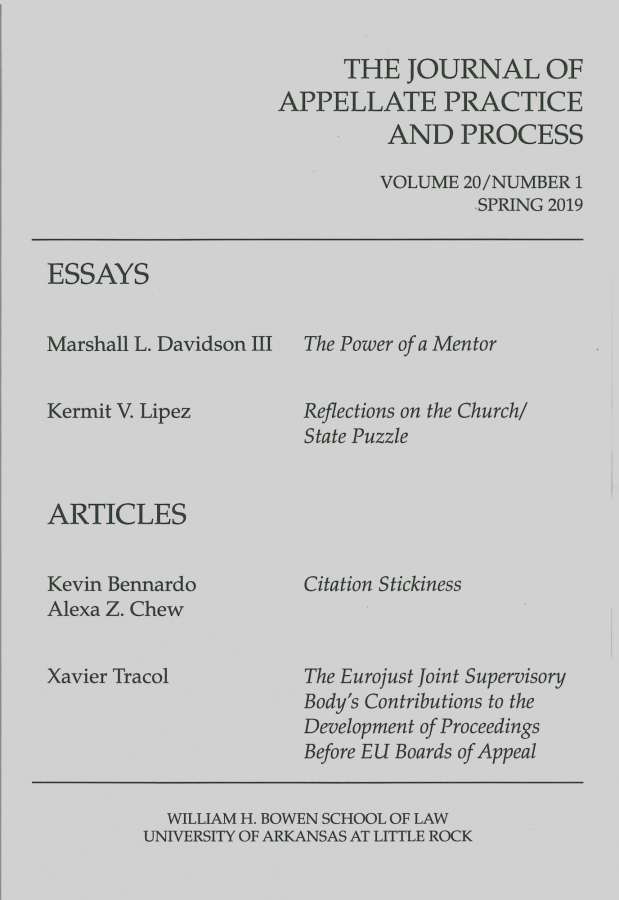After 20 years of residency at the University of Arkansas at Little Rock’s Bowen School of Law, The Journal of Appellate Practice and Process — the leading academic publication in the appellate law field — has moved to the University of Arizona.
The journal’s move to Arizona Law was in part due to Arizona’s longstanding reputation as a leading institution in legal and persuasive writing and appellate advocacy. Nationally recognized faculty in this field include Susie Salmon, a coauthor of “The Moot Court Advisor’s Handbook”, a leading publication on appellate instruction; Sylvia Lett and Joy Herr-Cardillo, faculty with federal appellate court experience; Diana Simon, who will serve as the managing editor and Tessa Dysart, assistant director of legal writing and the journal’s new editor-in-chief. All of whom will serve as editors in some respect for the recently moved publication.
RELATED: Campus reentry update: Robbins and Carmona share details on new classroom modalities
The journal’s relocation not only speaks to the UA’s legal writing reputation, often ranked in the top 25 law schools for legal writing, but also will serve to improve Arizona’s reputation in appellate law.
“I expect the Journal to bring appellate experts and judges to the University of Arizona Law to speak and lecture on the articles that the Journal publishes,” Dysart said in an email interview with the Daily Wildcat. “When things go back to normal, we may even host an appellate conference on the articles published in the Journal.”
To Dysart, the journal’s move also means a significant increase in the network of appellate law professionals who will come to the university and provide educational and professional opportunities for Arizona law students interested in appellate practice.
“This move is a huge opportunity for University of Arizona Law because it connects us with a broad spectrum of federal, state, international, and tribal appellate judges and highlights our faculty expertise on appellate issues,” Dysart said in email. “The Journal is well respected by appellate judges. I have heard from judges that it is one of the publications they regularly read. Since taking over the Journal, I have been overwhelmed by the number of persons, including judges and well-known figures in the appellate world, who have expressed their happiness that we are taking it over.”
Part of what makes the journal unique as a legal publication is that it is not only referenced scholastically, but is also often cited by appellate courts, and judicial officials in their professional opinions. It was cited over 100 times in 2019 opinions alone according to a press release from the UA’s James E. Rogers College of Law.
Arkansas professor J. Thomas Sullivan, the publication’s founder and first editor commented on the journal’s scholastic and pragmatic roles in the same June press release.
“Appellate lawyers were happy to see a law journal that addressed their practical concerns while furthering scholarly discussion about the future of the appellate process,” he said in the press release. “The Journal has been pleased to play a part in supporting that dialogue as appellate law and procedure have developed in new ways.”
Every federal and state appellate judge in the country receives a complimentary copy of every issue of the journal, according to Arkansas’s Bowen School of Law.
RELATED: What the ICE reversal means for international students, university community
The journal’s first publication at Arizona will be Issue 1 Volume 21, which, according to Arizona Law’s press release will “include a comprehensive assessment of the reasonableness standard, a scholarly review of the United States Supreme Court’s grant-vacate-and-remand practice, advice on structuring appellate briefs, a plea for shorter appellate opinions, and a look at the ways in which the COVID-19 pandemic has affected appellate courts and appellate practice.”
To Dysart, the transition and publication of the journal during a pandemic will give the publication’s first issue an opportunity to review how appellate practice is changing.
“The first issue that we publish will contain several articles on how oral argument has changed with COVID,” Dysart said in an email.
Dysart also said the issue will include a contribution from UA Law alumnus Thomas L. Hudson.
Part of the journal’s transition to Arizona also means a transition of the publication to an electronic format, an initiative taken by the publication’s editors at Arizona Law with the intention of creating wider access to the publication.
“I hope that the move online will broaden the reach of the Journal,” Dysart said in email. “First, this move will make the Journal more accessible to appellate practitioners and students who are increasingly reading content digitally. It will also broaden the Journal’s global reach and make it more accessible to international appellate practitioners and judges.”
The exact date of Issue 1, Volume 21’s publication has yet to be announced.
Follow Ian Tisdale on Twitter









